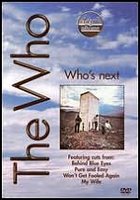

Classic Albums: Who’s Next & The Joshua Tree
By The Who & U2 (no kidding)
Eagle Media
Remember albums? They used to be more than a collection of tracks to download. Classic albums have become cultural artifacts in and of themselves. The music is instantly recognizable and the cover art has entered the public consciousness as iconic images from music history. The Classic Album series celebrates the making of some of the most recognizable and iconic, recently including Who’s Next and The Joshua Tree.
Obviously, Who’s Next is a great rock album—it supplied theme music for two CSI series. “Babu O’Riley” (CSI NY) is perhaps most representative of the innovative use of synthesizers on the album. It is also one of the more misunderstood Who songs, as Pete Townsend explains:
“For me you know, that notion of teenage wasteland is about waste. It’s not about getting wasted. It is about waste. It’s about wasted life, wasted opportunity, wasted years. I take full responsibility for the fact that my generation complained about the state of the planet and did nothing to change it.”
Who’s Next was a sort of concept album, consisting of tunes composed for Townsend’s aborted film scenario The Lighthouse, and is also distinguished by the experimental elements. It is interesting to hear Townsend’s solo take on “Won’t Get Fooled Again” (you know, CSI Miami), which shows how well the song works stripped down to its barest elements.
On both Who’s Next and Joshua Tree it is fascinating to see the band sharing the credit and the spotlight with their producers and engineers. Obviously, an atmosphere of respect leads to better results in the studio. In discussing his influence on “I still haven’t Found What I’m Looking For,” co-producer Daniel Lanois says:
“I’ve always liked gospel music and I encouraged Bono to take it to that place, which he did. It was a very non-U2 thing to do at the time, you know, to go up the street of gospel.”
It is clear that the band and co-producers Brian Eno and Lanois still have a strong working relationship. Also noteworthy, there are no sermons from Bono on African debt, although Adam Clayton does get political when discussing “Mothers of the Disappeared.”
One wonders if this series will only be able to mine the past for future installments, or if rock and pop can still produce great albums. Certainly jazz still can, and does regularly, producing disks like Pat Metheny’s The Way Up and Andrew Hill’s Time Lines that one can expect to stand the test of time. From my perspective it does seem like rock and pop are in a bit of a slump, but comparing current albums against Who’s Next and Joshua Tree, is not a fair standard by any measure. Opening a window into their production actually may make viewers appreciate them more.